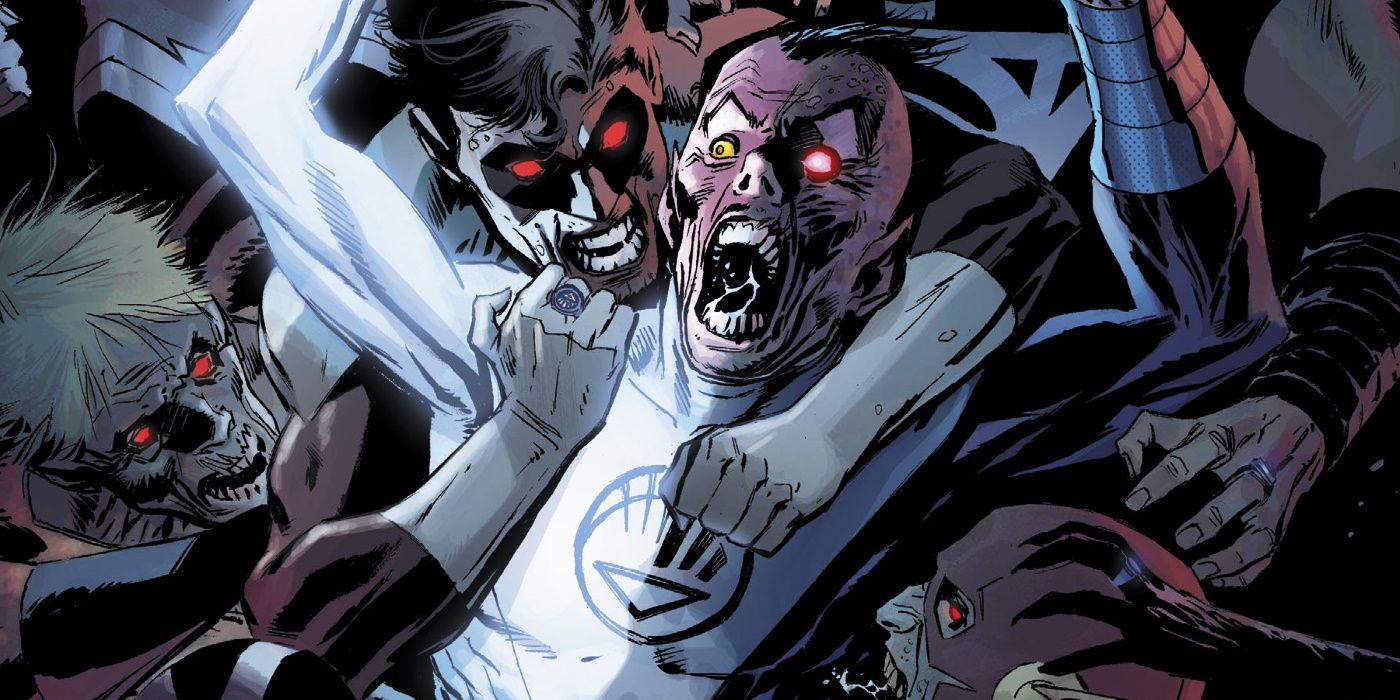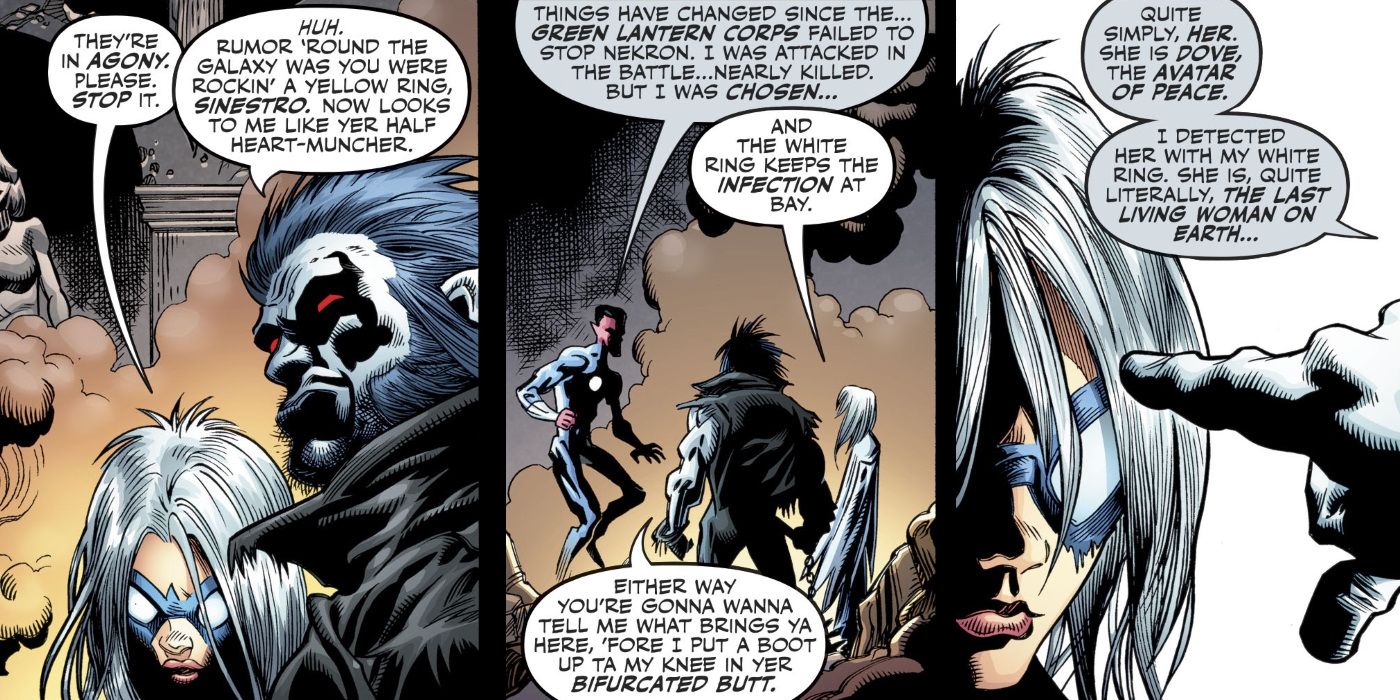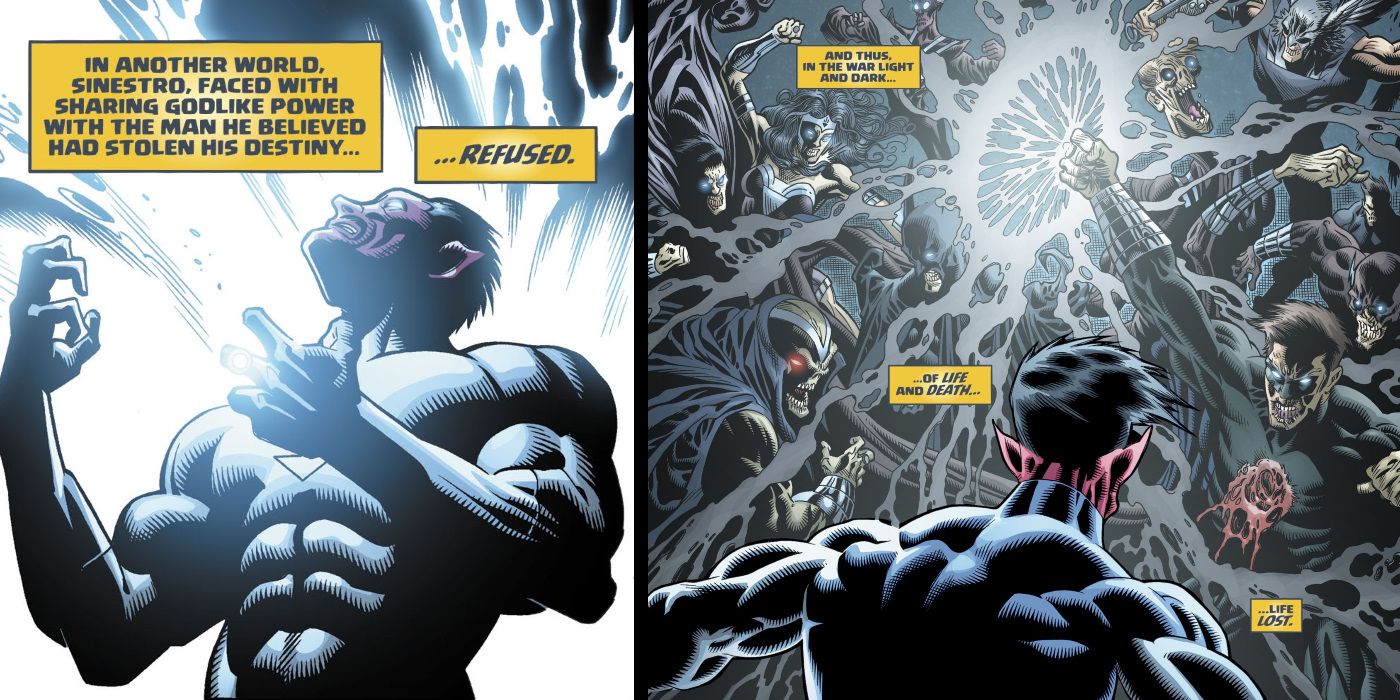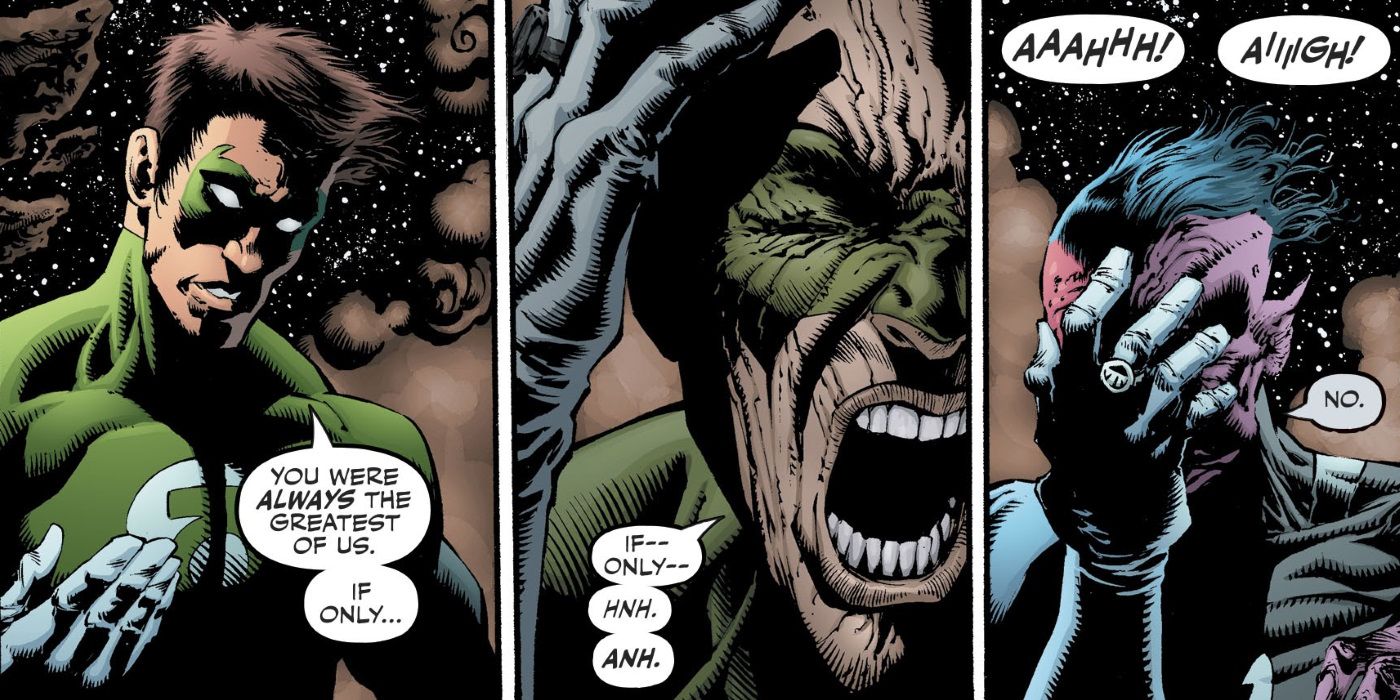Without much thought, the 'Dark Multiverse' became an obvious draw for DC Comics fans, showing all the realities which demonstrated what nightmares were possible. All heroes needed to do is make the wrong choice, at the most important moment. And now fans are being asked: what could have turned out darker than the Blackest Night?
That's the terror which unfolds in Tales from the Dark Multiverse: Blackest Night, retelling the Green Lantern event that changed the DC Universe forever, "...only this time, the Black Lanterns win!" Previous entries in the Tales series showed how bad things could get if Batman lost during Knightfall, or if Lois Lane avenged The Death of Superman. But those all pale in comparison to the victory of the Black Lanterns. A victory that doomed the DC Universe to levels of death never witnessed before. A universe now occupied only by a handful of unkillable heroes...and Sinestro, the Limbo Lantern! Screen Rant got the chance to discuss Tales from the Dark Multiverse: Blackest Night with writer Tim Seeley, and readers can find the full interview below.
Can you take me back to the beginning of this Tales from the Dark Multiverse line, and how you were introduced to this as a premise? How it became something you decided you wanted to be a part of?
I worked with the editors Dave Wielgosz and Alex Antone a lot, and I really liked those guys. I had done a lot of short stories with them, we had done like, the [Beach Blanket Bad Guys] and that sort of stuff. And I love doing one-off stories, it’s such a rare treat to get to do in comics. So they had just asked about this idea, which was redoing events though the filter of the Dark Multiverse. They had thrown a couple of the ones they were working on and I was like, 'Yep, Blackest Night. Yep, that would be perfect for me!' Because I knew I could do a horror version of it, I could do a survival zombie tale through the filter of a DC superhero story.
I know the other writers on these Tales from the Dark Multiverse have spoken about their stories sticking with them at the time, or there was something about the book and its place in history that really resonated with them. How did Blackest Night end up being the story you were going to tell?
I mean, yeah. I think it’s a cool story. I think it introduces so much mythology to the Green Lantern universe that’s still so relevant and important today. But for me, I think it was just the chance to do a cosmic story with a lot of different elements that don’t traditionally get to be part of it. I think the original story is a war story, really. It has a lot of horrific elements to it, but it’s a force of evil and a force of good, and it’s definitely a big war battle kind of story. I felt like there was a chance to do a survival horror story with it: focus on a small cast instead of a huge cast, which I think the original obviously has to do because it’s such a big story. This allowed me to tell a smaller story but make it really frightening and emotionally powerful, and get to play with some toys that I don’t normally get to play with.
This book does stand apart from some of the others published thus far, since it becomes a team-up story really quickly. Not just Sinestro, but bringing in Dove, Lobo, and other less obvious embodiments or avatars of life and death. You're really getting at the surrounding event, as opposed to a Green Lantern, specifically.
Yeah, for sure. Because the original is a war story and it’s very much a Green Lantern story, we see bits of Hawk and Dove’s part in that story, and we see the implication that Dove has some kind of power that resists them. We just don’t get to see a lot of it obviously, because it’s a Green Lantern story. But I thought it would be cool... you know in the original story we never see the New Gods, and we never saw Lobo. I felt there was something, we could have some fun with them living in a world in which a failure of Sinestro messed up everything. And they’re survivors because of various reasons, you know? Dove because she’s unaffected by the Black Lanterns, and Lobo because of that as well, and also because he doesn’t give a crap about any of this, and Mr. Miracle because he’s so clever that he manages to essentially trap himself and keep them away. So I just thought it would be a cool way to explore other impacts of that kind of story but in a different genre, and with a different theme.
Does every writer want to write Lobo, or Mister Miracle? It seems like that's on the bucket list for a lot of writers, and you got to do them both in one adventure.
[Laughs] Yeah. Yeah, I don’t know why certain characters are so appealing. Lobo certainly, because for me, that’s the kind of character that I can write without effort. It’s a lot of work for me to figure out some characters and their personality but I don’t have to work at Lobo at all, I just get it. And Mister Miracle I think is such a great concept. It’s a uniquely superhero idea, there is nothing else like him. I mean, escape artist, space Jesus who is so weird and wonderful. And his affection for his wife is something I feel a lot of writers really like to dive into. Then putting them all together, it’s like, 'What other opportunity would I have to do a team up series with those guys?'
The fans who remember the entire Blackest Night event would probably have a hard time picking a single 'moment' where things could've gone so wrong. So how did you come to this jumping off point, anchoring it in Sinestro's choice specifically?
Well it’s definitely tough because the story is really tight and very much a Hal story. There is a lot of other people in it, but Hal is the through line there. But we just knew the failure of it couldn’t be a Hal failure story, because we’ve seen that, you know? And we’ve seen the Parallax sort of temptation, and that’s so similar to the Black Lantern thing, I kind of felt like you couldn’t repeat those beats if you didn’t have anything new to say about it. But I think early on we came to the idea that there is a moment in there where Sinestro to some degree saves the day, right? Because he shares the White Lantern power and he brings back the White Lantern entity, and that’s something that seems like it tipped the scale. I mean it doesn’t seem as important in the story overall when you read it but, as interpreted by us, we said that’s a moment where he kind of redeems himself. So the twist for us was: we’ve seen Hal fall and we’ve seen Sinestro be bad... but what if Sinestro did something good, and still managed to mess things up?
It does allow you the chance to have Sinestro reveal the truth about his rivalry with Hal Jordan. Another thing he would never admit unless everyone else in the universe was dead.
[Laughs] Yeah. I mean, a part of it was we were trying to complete the emotional arc of a bad guy, and especially a guy like Sinestro who is a pretty complex character, actually. I think at the end you always kind of come to this… to some degree they either envy or love their hero, right? I mean they wish they were them, they wish that they had made those choices, and they weren’t the guy that had suffered and made people suffer. I think we all kind of understand that in some scenarios we’re the villain, and we really wish we had made the choices that had made us the good guy. So, I thought that was so appealing and humanizing.
This is a really dark story, and it's following several really successful horror stories coming from DC. What is it about taking these heroes to such a dark place that isn't just something writers love, but usually results in really, really potent writing? Also coming amidst so many people saying superhero stories are too dark, or this is darker than they would like their heroes to be.
That's interesting, I would say it’s the opposite. I think the readers love this stuff, especially readers who have been around and are kind of jaded. Like, if you’ve been around and you’ve been reading this stuff a long time, to some degree you like to see the good guys lose. You kind of love to see them tormented. I think this goes back to Dark Knight Returns, and that era when superhero readers sort of stuck around a little longer than they were intended to, and so to keep them excited you had to shock them by like killing Robin and blowing off people’s arms and stuff. That’s still true today, I even make a joke of it in the book, at least a joke to myself, that the first things we kill off are the Teen Titans. Because every time something goes dark in comics we always punish the teenagers. It’s just like, 'kill those teenagers because the older fans hate them.' So I think fans really respond to that sort of stuff. And as writers it’s easy to do. I mean, it’s so hard to make superheroes make choices that are heroic, and that all sort of works out as a great story, and maintain that level of heroism, and don’t have moral failings, because most of us are not that good. It’s easy to write broken Batman, it’s easy to write jaded Superman, it’s ten times easier than it is writing the good guy version of those characters. So for us, the appeal is it generally is just a much simpler job. And people will think it’s cool.
How did your idea of this story change once Kyle Hotz started turning in pages of his artwork? Some of this stuff he gets to create by the end of the story is hard to believe.
I’m a Kyle Hotz fan going back to when I was a teenager, and I know he hates when I say that because it makes him feel old, because I’m 42, so he’s been at this a while. But he and I had talked about doing something together for a long time. We had done a Swamp Thing story together, and I just wrote a Kyle Hotz story. I just wrote anything he wanted to draw. So he said, 'Let’s do that again some time,' because he knows that I’ll do that for him and because I think our sensibilities are kind of similar. So as soon as this came up, I wanted to work with Kyle on it. It’s a horror story, it’s a zombie story, it very much feels like kind of an old, creepy, or eerie, Tales from the Crypt kind of horror story. So having Kyle’s art on it is perfect. There’s a couple of splashes in there that I just was just delighted to see his drawings. But you can see his enthusiasm for drawing Lobo clear as day. He couldn’t be happier to be drawing Lobo. I think he would put away drawing anything else to draw more Lobo faces.
The impact of those final pages are cemented into my brain now, as one of the 'final fates' of the DC Universe. I don't know if it's a fantastic ending, or an absolutely tragic one.
It’s incredibly tragic! It’s the dark universe, I mean, to me the ending felt like an old Lobo comic, you know. The old Lobo books, the ideas were always to go as far as possible and almost to make fun of themselves completely. But also to dare you to give a sequel. You know, they’ll be like, 'Well Lobo now fights gods so what are we going to do after that?' And people would be like, 'Give us more!' And they’d go, 'Alright, how do we follow up Lobo fights gods?' I felt like I had to end this book in the spirit of a Lobo comic.
Tales from the Dark Multiverse: Blackest Night is available now from your local comic book shop.




